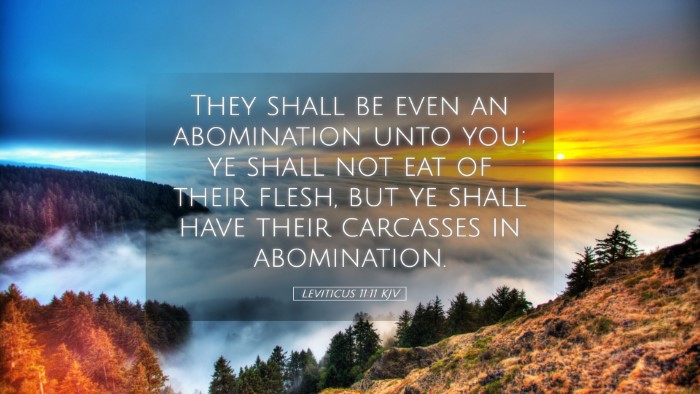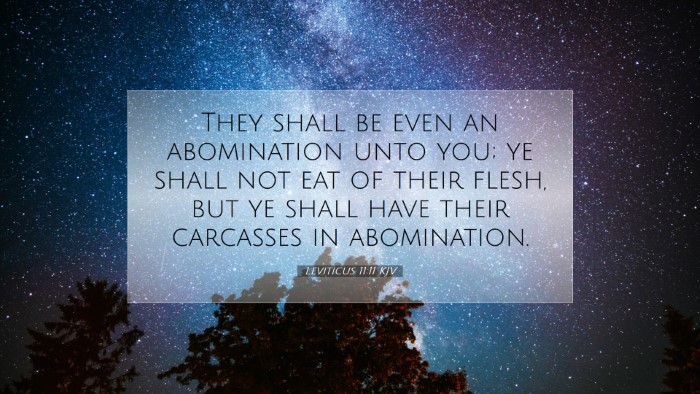Commentary on Leviticus 11:11
Verse: "They shall be an abomination unto you; ye shall not eat of their flesh, nor touch their dead carcass; they are unclean unto you." (Leviticus 11:11)
Introduction
The dietary laws presented in Leviticus 11 are a significant part of the Old Testament, reflecting God's instructions to the Israelites concerning clean and unclean animals. According to Hebrew tradition, these laws are steeped in theological and practical implications. This commentary aims to explore the spiritual, moral, and ceremonial aspects of Leviticus 11:11, drawing insights from public domain commentaries.
The Context of Leviticus 11
The context of Leviticus is crucial as it is set within the broader framework of the covenant between God and Israel. Matthew Henry highlights that these laws served not merely as dietary restrictions but as a means of separating the Israelites from the nations around them, emphasizing holiness. The dietary laws, including the prohibition of certain creatures, were intended to draw attention to the importance of obedience to God's commands.
Understanding Clean and Unclean
Albert Barnes elucidates the distinction between clean and unclean animals, framing it within the narrative of sanctity and purity. The creatures identified as unclean serve as a metaphor for moral states that believers are to avoid. This perspective encourages a deeper examination of what it means to maintain spiritual cleanliness in light of God's holiness.
Specific Considerations of Unclean Animals
- Symbolism: Adam Clarke notes that the designation of animals as "unclean" is not purely about physical characteristics but is deeply symbolic. These creatures, often scavengers or predatory, speak to spiritual degradation, reflecting the destructive powers that sin can bring into one's life.
- Philosophical Implications: Henry observes that the idea of being "an abomination" transports the discussion into the realm of morality. God does not simply prohibit these animals; He declares them an abomination, which illustrates the gravity of disobedience and moral compromise.
- Societal Impact: The dietary laws functioned socially as well, delineating boundaries that helped to foster a sense of community among the Israelites. Barnes notes that these laws helped maintain cultural identity amidst surrounding nations.
Spiritual Applications
The prohibitions surrounding unclean animals can be understood as a framework for spiritual discipline. Clarke articulates that adherence to these laws may be seen as preparatory training for greater moral and spiritual truths. The faithful are reminded to be vigilant in their conduct, paralleling dietary observances to moral purity.
The Lesson of Divine Holiness
This passage reflects God's ultimate desire for His people to embody His holiness. The call to avoid unclean animals mirrors a broader call to reject sin and embrace righteous living. Adam Clarke emphasizes that the believer's attitude toward sin should mirror the same repulsion that is directed towards these designated unclean creatures.
Challenges in Interpretation
Understanding the relevance of these dietary laws in contemporary faith practices can be challenging. While many Christians see these laws as Old Testament regulations, the moral truths underlying them remain significant. Henry argues that believers today should strive to grasp the spirit behind these laws, prioritizing holiness and purity while recognizing that the cultural specifics may differ in application.
The Impact on Christian Theology
The implications of Leviticus 11:11 go beyond dietary practices; they contribute to our understanding of Christian theology concerning sin and grace. Barnes asserts that the moral imperatives found here are foundational in the biblical narrative of redemption. The New Testament presents these concepts through the lens of Christ, who fulfills the law and calls believers to a higher standard of living.
Conclusion
Leviticus 11:11 invites believers into a profound contemplation of what it means to be set apart for God. Through careful adherence to these ancient laws, there emerges a timeless call to maintain purity and holiness in our lives. Understanding these intricacies provides pastors, students, theologians, and scholars with valuable insights into the nature of God’s expectations for His people.


